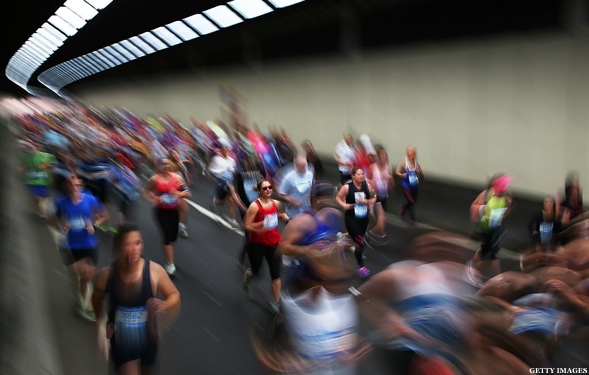
One of the most interesting and discussed theories about achieving success put forth in the past decade comes from the popular journalist Malcolm Gladwell. In his book Outliers, Gladwell proposes that it takes around 10,000 hours of practice to achieve success in a certain field.
The theory, which is based on studies by researcher Anders Ericsson, relies on a few prominent examples. Gladwell notes that the Beatles had about 10,000 hours of practice before they became popular, and Bill Gates had the same amount of programming experience.
Gladwell argues that the "10,000-Hour Rule" applies to sports as well, but in a new book on athletic performance Sports Illustrated writer David Epstein claims that the theory is a vast oversimplification.
In his book, The Sports Gene: Inside the Science Of Extraordinary Athletic Performance, Epstein studies the role of genetics in sports. In an interview with Outside magazine, Epstein said Gladwell largely ignored the crucial role that genes play in achieving athletic success:
"I remember writing a story about brain trauma at Purdue and watching video of a hit LaDainian Tomlinson took. He fell on his head and these scientists said, “Wow, he should have broken his neck. That's your 10,000 hours there. That guy has put in his time of taking hits and a normal person would have broken their neck.” And I thought, “Seriously, we’re going to use this everywhere?” I talked to Olympic scientists a lot and they didn’t seem to think about the science or have even read they underlying paper. They knew nothing about it. The study is based on the practice hours of 10 people who are already in a world-famous music academy, so they’re already prescreened. When you take a study and you already screen out most of the gene pool, it’s not a very representative sample."
Epstein told Outside that Gladwell's mistake came in averaging. Say it took one NBA player 15,000 hours to make it to the pros but it only took Michael Jordan 5,000. Together that makes 10,000, but it's not that simple. Epstein uses chess masters as an example:
"Researchers found it takes 11,053 hours on average to achieve international master status. But the range there is what’s important. One guy takes 3,000 hours to become a master and another takes 25,000 and he’s still not there. So you can average those and come up with some rule, but it doesn’t tell you anything. You can always average individual differences and come up with some sort of a rule. Gladwell does leave more room for elite talent. He says, “Michael Jordan has more talent than me, but he also put in the work.” And that’s uncontroversial, that someone is talented and put in work. Beyond the chess players, genetics is continually finding now that one person’s hour of practice isn’t as good as the next person's hour. Talent isn’t something preceding you trying something, but your biological setup that allows you to benefit more than the next guy."
According to Epstein, the "10,000-Hour Rule" can be misleading and even harmful. If an athlete who doesn't need to practice that much is set out to reach the milestone, she may injure herself by overtraining. Ultimately it is up to each athlete to determine his or her ideal amount of repetition.


